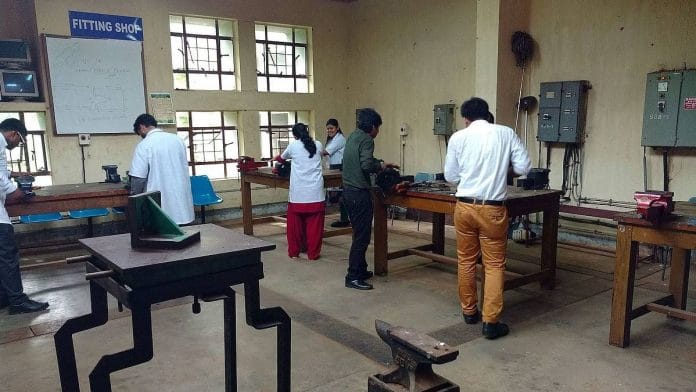New Delhi: In its first year of offering engineering courses in regional languages, the All India Council for Technical Education (AICTE) has been able to fill just about 21 per cent of the seats on offer, ThePrint has learnt.
The council had last year approved engineering courses in regional languages from the academic session 2021-22. The move came as part of the Narendra Modi government’s push for education in regional languages — as advocated in the National Education Policy (NEP) 2020. The NEP talks about imparting education in regional languages at every level.
Speaking to ThePrint last year, AICTE chairman Anil Sahasrabudhe had said that in a survey, nearly 44 per cent of the existing students in engineering colleges across the country had shown interest in pursuing education in regional languages, and the decision to finally introduce such courses was taken on the basis of the survey, among other things.
However, the initiative seems to have found few takers.
According to data accessed by ThePrint for the academic year 2021-22, the AICTE had approved 1,230 seats in 19 engineering institutes across the country, out of which 255 seats have been filled.
Of those who have opted for these courses, students have sought admission in Hindi, Marathi, Tamil, Telugu and Bengali. However, there have been no takers for engineering in Kannada, the data showed. Hindi was the most sought-after, with 116 students picking it, followed by Marathi (60), Tamil (50), Bengali (16) and Telugu (13).
According to AICTE officials, the slow start is due to a lack of faith about reading material being available in regional languages.
“We believe that the low admissions are due to the fact that students think study material will not be available in regional languages. If a student is opting for engineering in a language other than English, he/she needs to be sure that they will get reading material. We have to build confidence in students regarding this,” AICTE member secretary Rajive Kumar told ThePrint.
He added that the council has prepared books in all languages and is now going to distribute them free of cost for the first-year students in all technical colleges. “It’s a new scheme and there will be hiccups initially, but we are trying to build confidence among students and hope that it will be successful in the future,” added Kumar.
The AICTE chairman also expects an upswing. “Admissions will pick up gradually,” Sahasrabudhe told ThePrint.
Also read: Modi govt working on policy to regulate edtech platforms, says Education Minister Pradhan
Karnataka expected better, now working towards improved results
No student has opted for a Kannada language engineering course, despite Karnataka having been the first state to announce the implementation of the NEP in August 2021, amid uncertainty from stakeholders and criticism from the primary opposition party, Congress.
Even earlier, in July 2021, Higher Education Minister and then-deputy CM, C.N. Ashwath Narayan, had announced that engineering and other professional courses would be offered in Kannada, beginning academic year 2022-23.
The announcement was formalised last year itself when the state regulator identified five engineering colleges — Cambridge Institute of Technology, Bengaluru; SJC Institute of Technology, Chikkaballapur; Coorg Institute of Technology, Ponnampet; Tontadarya College of Engineering, Gadag; and BLDE’s college of Engineering, Vijayapura — as willing to offer courses in Kannada.
However, by the time the admission process began, only three colleges — Maharaja Institute of Technology, Mysuru; Bheemanna Khandre Institute of Technology, Bhalki; and SJC Institute of Technology near Bengaluru — were found to have set aside 90 seats for engineering courses in Kannada.
As on 31 December 2021, the last date for admission, all three colleges reported zero admissions. Officials reportedly said three students had opted for Kannada medium engineering courses but none reported to colleges.
Speaking to ThePrint, minister Ashwath Narayan said the government expected a better response.
“We anticipated that students would be very keen on joining engineering courses in Kannada. We thought it was feasible because it will empower students to work in environments where Kannada is enough. Only when we give the opportunity will we know the response and we have done that,” he said.
Asked if the hurried implementation of NEP could be one of the reasons behind the dull response, the minister said measures will be taken to make the option more feasible.
“We will see how best we can make the course more feasible, acceptable, sustainable. After talks with Chief Minister Basavaraj Bommai, we will come up with ways of encouraging students to take up the course,” he said, adding that resources in terms of Kannada books and faculty who can teach in the language were ready.
(Edited by Amit Upadhyaya)
Also read: Out of 122 student suicides since 2014, 111 at central univs, IITs & NITs: Govt tells Lok Sabha






